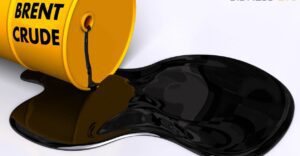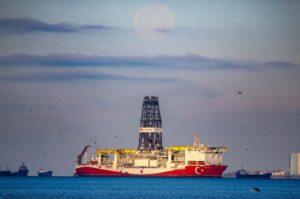
Oil prices rise on Monday after a significant fall on Friday and following the results of the entire past week.
Market fears associated with a possible decrease in demand for energy resources in the world remain, and this factor is likely to continue to put pressure on the oil market, Bloomberg notes.
Chinese President Xi Jinping, speaking at the 20th Congress of the Chinese Communist Party (CCP), which opened on Sunday, signaled that the country’s authorities would continue their tough policy to contain the spread of COVID-19, which has already seriously weakened the country’s economy this year.
The cost of December futures for Brent crude on the London ICE Futures exchange by 8:10 pm on Monday is $92.31 per barrel, which is $0.68 (0.74%) higher than the closing price of the previous session. As a result of trading on Friday, these contracts fell by $2.94 (3.1%) to $91.63 per barrel.
The price of futures for WTI oil for November in electronic trading on the New York Mercantile Exchange (NYMEX) rose by this time by $0.62 (0.72%), to $86.23 per barrel. By the close of previous trading, the value of these contracts fell by $3.5 (3.9%) to $85.61 per barrel.
As a result of last week, Brent fell by 6.4%, WTI – by 7.6%.
“The momentum we see today is likely to be short-lived as there is no clear reason for a rally,” said Vanda Insights founder Vandana Hari. “Investors may now be seeing profitable opportunities in the market after last week’s sharp drop.”

Oil prices began to rise moderately during trading on Thursday, recovering from the decline over the previous three sessions.
December futures for Brent on London’s ICE Futures exchange increased by $0.38 (0.41%) to $92.83 per barrel by 15:06 CST.
Quotes of futures for WTI for November in electronic trading on the New York Mercantile Exchange (NYMEX) by the specified time increased by $0.28 (0.32%) – up to $87.55 per barrel.
On Wednesday, Brent shed 2%, WTI – 2.3%, both brands finished in the red for the third session in a row.
Traders’ attention on Thursday is focused on the US Department of Energy’s report on energy stocks in the country over the past week, which will be published at 18:00 Moscow time on Thursday.
Experts polled by S&P Global Commodity Insights predict a weekly increase in US oil inventories by 2.2 million barrels, as well as a decrease in gasoline and distillate reserves by 2.1 million and 2.3 million barrels, respectively.
Data from the American Petroleum Institute (API), released yesterday, showed an increase in US oil inventories for the week ended October 7 by 7.1 million barrels after a decrease of 1.77 million barrels a week earlier.
Meanwhile, the International Energy Agency (IEA) on Wednesday lowered its 2022 oil demand growth forecast by 100,000 b/d to 99.6 million b/d. Thus, in 2022, the IEA expects global oil demand to grow by 1.9 million b/d against 2 million b/d a month earlier. The estimate of global oil demand in 2023 has been reduced from 101.8 million b/d to 101.3 million b/d.
The agency notes that the estimate of global demand has been adjusted due to the deterioration of the global economy, as well as rising fuel prices due to the adopted OPEC + plan to reduce production.
“Sustainable growth prospects are rapidly fading away amid persistent inflationary pressures, quantitative tightening, regular increases in borrowing costs, a strong dollar and coronavirus-related restrictions in China, the world’s second-largest economy,” said PVM analyst Tamas Varga.

Ankara intends to produce oil and gas in the waters of Libya within the framework of the energy agreement concluded by Turkey with this country, Turkish President Recep Tayyip Erdogan said.
“After the agreement on hydrocarbons signed by us with Libya, we will cooperate in a new area – in the extraction of oil and other resources from the Libyan continental shelf,” Bloomberg quotes him as saying.
Erdogan also announced plans to double the capacity of the Trans-Anatolian gas pipeline (TANAP), which runs from Azerbaijan through Georgia and Turkey to Greece.
Bloomberg recalls that Ankara and the administration of Abdel Hamid al-Dbeiba concluded this agreement last week: he was supposed to leave the post of prime minister after December 25, 2021, but did not do this, citing the disruption of the presidential elections in Libya. As a result, the Prime Minister of another Libyan government, Fathi Bashaga, rejected this agreement, emphasizing that al-Dbeiba does not have the authority to conclude agreements with foreign states.
At the same time, the current agreements are based on the 2019 agreement that Ankara concluded with the previous internationally recognized government of Libya, and to which Turkey provided military assistance in the confrontation with the forces of Marshal Khalifa Haftar.
In turn, the EU said that the new agreement does not comply with the UN Convention on the Law of the Sea and violates the interests of third parties. Also, Greece, Cyprus and Egypt regard the agreement as an attempt by Turkey to dominate the waters of the region.
In Libya, for a long time, there were two bodies of executive power in parallel: the Government of National Accord in Tripoli, in the west of the country, and an interim cabinet in the east of the country, supported by the army of Marshal Khalifa Haftar. According to Western media, Haftar’s forces were supported by Russia, France, Saudi Arabia, the United Arab Emirates, Egypt, Greece and Cyprus. On the side of the government in Tripoli, in turn, were Turkey, Qatar and Italy.
In October 2021, in Geneva, representatives of the warring parties signed an agreement on a permanent ceasefire. The presidential elections in Libya, the first after the overthrow and assassination of Muammar Gaddafi, were scheduled for December 24, 2021, but in the end the vote did not take place. This was due to controversy surrounding the electoral law.
GAS, OIL, PRODUCTION, TURKEY

Oil prices deepened their decline on Tuesday afternoon on concerns about global fuel demand and a stronger dollar.
December futures for Brent on London’s ICE Futures exchange fell by $2.14 (2.22%) by 14:30 CST to $94.05 per barrel.
Quotes of futures for WTI for November in electronic trading on the New York Mercantile Exchange (NYMEX) by the specified time fell by $2.28 (2.5%) to $88.85 per barrel.
On the eve of Brent fell 1.8%, WTI – 1.6% after the publication of data that the Purchasing Managers’ Index (PMI) in China’s services sector, calculated by Caixin Media Co. and S&P Global, fell to 49.3 points in September from 55 points in August.
An index value below 50 points indicates a drop in business activity in the service sector. The indicator in the world’s second largest economy and largest importer of fuel fell below this mark for the first time in four months.
Meanwhile, Shanghai and several other major cities in China have ramped up coronavirus testing of residents to the most active level since August and imposed travel restrictions, writes Barron’s. Such measures may be linked to the 20th Congress of the Communist Party of China, which will begin in Beijing on October 16.
Additional pressure on the quotes is exerted by a strong dollar, which continues to strengthen on the statements of the Federal Reserve System management.
By the beginning of next year, the level of the key interest rate in the US may slightly exceed 4.5%, according to the chairman of the Federal Reserve Bank (FRB) of Chicago, Charles Evans. According to him, the Fed will need to keep rates high for some time to cool the economy and the labor market.
Meanwhile, Fed Vice Chair Leil Brainard noted the need for tighter monetary policy to slow inflation, but added that the Central Bank’s decisions will depend on incoming statistical data.
“The Fed is likely to raise rates by another 75 basis points in November, which will strengthen the dollar and limit the rise in oil prices,” Schneider Electric analysts wrote.

Oil prices fall on Monday after rising by more than 15% last week amid the decision of OPEC + to cut production immediately by 2 million barrels per day (b / d).
Market fears related to the possibility of falling energy demand following the weakening of the global economy as a result of the rapid tightening of policies by world central banks remain, Bloomberg notes.
US unemployment statistics released last Friday showed that the US labor market is still strong. This was taken by traders as a signal that the Federal Reserve (Fed) may again raise the rate by 75 basis points (bp) at the next meeting.
The price of December futures for Brent crude on London’s ICE Futures exchange is $97.08 per barrel by 8:10 qoq on Monday, which is $0.84 (0.86%) lower than the closing price of the previous session. As a result of trading on Friday, these contracts rose by $3.5 (3.7%) to $97.92 per barrel.
The price of futures for WTI oil for November in electronic trading on the New York Mercantile Exchange (NYMEX) fell by this time by $0.77 (0.83%), to $91.87 per barrel. By the close of previous trading, the value of these contracts increased by $4.19 (4.7%) to $92.64 per barrel.
As a result of the week, Brent has risen in price by 15%, WTI – by 16.5%.
As reported, OPEC+ last week decided to cut its November production quota by 2 million barrels per day compared to October, the largest cut since the start of the coronavirus pandemic.
“In reality, the decline will be only about 1 million b / d, since oil production in many countries was already lagging behind quotas,” Commerzbank analysts cited by Bloomberg said. “This, however, will be enough to prevent an excess of supply on market forecast for the fourth quarter.

Oil prices changed little on Friday morning after rising for four sessions in a row on the decision of OPEC+ to cut production by 2 million b/d.
The cost of December futures for Brent crude on the London ICE Futures exchange by 8:10 am CST on Friday is $94.22 per barrel, which is $0.2 (0.21%) lower than the closing price of the previous session. As a result of trading on Thursday, these contracts rose by $1.05 (1.1%) to $94.42 per barrel.
The price of futures for WTI oil for November in electronic trading on the New York Mercantile Exchange (NYMEX) fell by this time by $0.19 (0.21%), to $88.24 per barrel. By the close of the market on Thursday, the value of these contracts increased by $0.69 (0.8%) to $88.45 per barrel.
Brent recently updated a maximum for a month, WTI – has grown to a maximum since September 14, according to Dow Jones Market Data. Both varieties could end the week up 11%.
Oil quotes have been rising since Monday, first on expectations of the OPEC + decision, and then on the decision itself.
Ministers of the OPEC+ countries on Wednesday approved a reduction in the quota for oil production in November by 2 million b/d compared to September. This is the largest decline since the start of the coronavirus pandemic.
However, the real reduction in production will be less than the declared one – by 1-1.1 million barrels per day, the Minister of Oil of Saudi Arabia said, explaining that in some countries of the alliance, real production is in fact below the quota.
At the same time, further production cuts could accelerate the acceptance of a price cap for Russian oil by Western countries, analysts said.